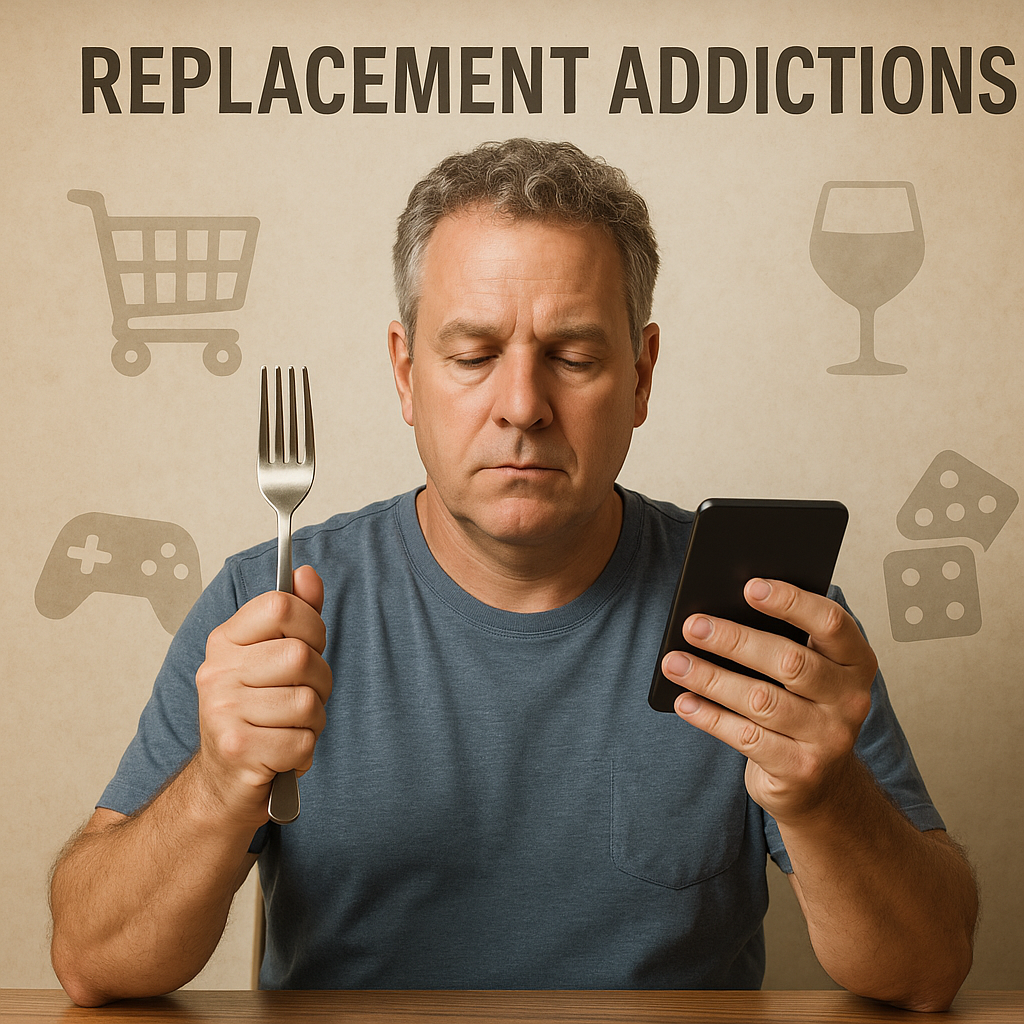
Breaking the Cycle: Understanding and Managing Transfer Addictions After Bariatric Surgery
Share
Embarking on the transformative journey of bariatric surgery can be both exhilarating and challenging. While the physical changes are often the primary focus, the psychological shifts that accompany this life-altering experience can be equally profound. One such phenomenon that many post-surgery individuals grapple with is the emergence of transfer addictions—the replacement of one compulsive behavior with another.
Understanding Transfer Addiction
Transfer addiction, also known as addiction displacement, is a well-documented occurrence following bariatric procedures. As individuals lose weight and gain control over their physical health, underlying emotional drivers of addiction may resurface in different forms【Harvard Health Publishing – 2020](https://www.health.harvard.edu/blog/after-weight-loss-surgery-some-face-a-new-risk-addiction-2020022818875)】. This often manifests in the development of new compulsive behaviors such as excessive shopping, gambling, substance misuse, or a return to disordered eating.
The reward pathways in the brain, particularly those involving dopamine, may adapt to seek alternative sources of gratification after food is no longer a primary coping tool【National Institute on Drug Abuse – Brain and Addiction](https://nida.nih.gov/publications/drugs-brains-behavior-science-addiction/drugs-brain)】.
Identifying Transfer Addiction Signs
Recognizing early warning signs of transfer addiction is critical. Common red flags include:
- Increased anxiety, depression, or mood swings
- Obsessive behaviors related to new addictions
- Avoidance of responsibilities or social withdrawal
- Secrecy or shame around behaviors
- Financial or legal problems due to compulsive actions
According to the ASMBS, up to 30% of post-bariatric patients may experience symptoms of substance use disorders or other behavioral addictions【ASMBS Resource Center](https://asmbs.org/resources/substance-use-after-bariatric-surgery)】.
Types of Transfer Addictions
1. Food-Related Behaviors
Even after surgery, food-related compulsions can persist or reappear in altered forms—like grazing, purging, or obsessive tracking—especially if underlying emotional triggers are not addressed【Journal of Obesity Surgery, 2021](https://link.springer.com/article/10.1007/s11695-020-05064-1)】.
2. Substance Abuse
Alcohol and drug misuse post-surgery are major concerns. Changes in alcohol metabolism after procedures like gastric bypass increase the risk of addiction, even for those without prior issues【JAMA Surgery, 2017](https://jamanetwork.com/journals/jamasurgery/fullarticle/2613974)】.
3. Compulsive Behaviors
Gambling, online shopping, or exercise addiction can emerge when individuals substitute one form of compulsion for another as a way to cope with stress, boredom, or emotional discomfort.
Psychological Roots of Transfer Addiction
Many transfer addictions are rooted in unresolved trauma, depression, anxiety, or poor emotional regulation. If pre-surgery mental health issues are not adequately treated, the risk for replacement addictions increases significantly【Cleveland Clinic – Transfer Addiction](https://health.clevelandclinic.org/transfer-addiction-after-bariatric-surgery)】.
Strategies for Managing Transfer Addictions
1. Professional Counseling
Engaging a licensed therapist or addiction specialist is essential for unpacking the emotional roots of addiction and building healthier patterns.
2. Cognitive Behavioral Therapy (CBT)
CBT is one of the most effective methods for addressing addiction-related thought patterns and behaviors【American Psychological Association – CBT](https://www.apa.org/ptsd-guideline/patients-and-families/cognitive-behavioral)】.
3. Holistic Wellness Strategies
Incorporate practices such as mindfulness, meditation, yoga, or journaling to enhance emotional regulation and stress management【Harvard Health – Mindfulness Benefits](https://www.health.harvard.edu/mind-and-mood/mindfulness-meditation-improves-wellness)】.
Building Healthy Replacement Behaviors
Constructive coping alternatives can support long-term recovery and include:
- Creative hobbies (music, art, writing)
- Volunteering or community engagement
- Mindfulness and breathwork practices
- Physical activities like walking, dancing, or yoga
- Strong social and emotional support networks
Support Systems and Resources
Professional Help Options
Structured addiction recovery programs or bariatric behavioral health clinics can provide individualized care.
Support Group Recommendations
Programs like Overeaters Anonymous, Celebrate Recovery, or online bariatric support forums offer connection and peer accountability【Obesity Action Coalition – Support Groups](https://www.obesityaction.org/community/find-a-support-group/)】.
Family and Community Support
Encourage family members to participate in counseling or educational sessions to better understand and support the patient’s experience.
Long-Term Management and Prevention
Regular follow-ups with healthcare providers, ongoing therapy, and proactive mental health care are essential for sustainable recovery. Patients should monitor stressors, track emotional patterns, and revisit strategies as needed to stay ahead of potential relapse.
Conclusion
Transfer addiction is a significant but manageable part of the post-bariatric journey. With evidence-based interventions, professional support, and a commitment to emotional healing, patients can break free from the cycle of addiction and step into a life defined by resilience, self-awareness, and lasting well-being.
Medical Disclaimer
This content is for informational purposes only and is not a substitute for professional medical or psychological advice. Always consult your healthcare provider regarding any changes in your treatment or mental health care plan.
